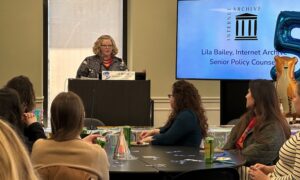Libraries, now more than ever, need innovative, dedicated champions to help them meet the needs of the public in the digital age. Internet Archive’s Lila Bailey said she sees hope in the talents of Georgetown University law students working at the school’s Intellectual Property and Information Policy Clinic (iPIP).

Lila Bailey gives the keynote address at Georgetown Law’s iPIP Clinic Celebration.
Bailey, Internet Archive’s senior policy counsel, was the keynote speaker at iPIP’s fifth anniversary celebration in Washington, D.C., on March 27. She praised the clinic for providing quality research and creative work products on projects that have helped the Internet Archive promote awareness of the public domain, controlled digital lending, and other issues related to the public interest mission of libraries at a challenging time.
“Libraries are at the forefront of using technologies of the day to serve the informational needs of their communities. And they do it without trying to sell you anything, and without selling any data about you either,” Bailey said. “Right now, libraries – whether they are digital, or brick and mortar – are under threat.”
Between moves to ban books, defund institutions, and dismantle the Institute of Museum and Library Services, libraries are facing perilous times. Publishers have simply stopped selling digital books to libraries, forcing them to use commercial platforms that come with terms and conditions that restrict how those materials may be used, Bailey explained. The iPIP clinic had a hand in drafting a paper on the topic, she noted, called, “The Publisher Playbook.”
Today, libraries need lawyers, yet most don’t have in-house counsel, Bailey said. That makes the contributions of student law clinics so vital at this juncture.
“Clinics play an important role in the library and public interest tech community by expanding our capacity to tackle these existential threats and to pursue opportunities for positive changes,” Bailey said. “[iPIP’s Founder] Amanda Levendowski has built a truly outstanding clinical program in these five short years.”
Bailey explained under copyright law, a library can lend out a book it owns to as many people as it wants to, for as long as it wants to. It can also preserve a book for the long term, and make it available long past when a publisher may sell it. The law also allows libraries to make copies of a book in an accessible format for patrons who are blind or have other print-disabilities, and participate in interlibrary loan arrangements, so that patrons of other libraries can access books they don’t have in their own collections. Yet, Bailey said, under these licensing models with publishers, none of those practices is allowed.
“These market-based threats are a completely new kind of challenge that require creative legal and policy interventions,” Bailey said.
In her remarks, Bailey described how her interest in the field began nearly twenty years ago when she chose to go to law school at University of California Berkeley, in part because of its Law, Technology & Public Policy Clinic. “[The internet] was new. I was optimistic to democratize access to information and saw it as a revolutionary force,” she said. Bailey’s first client at the clinic was the Internet Archive, working on a project that would eventually become the TV News Archive. She later became a teaching fellow at the clinic, and joined the Internet Archive staff in 2017.
Since iPIP’s first semester in 2020, Bailey said she has worked closely with student teams that exceeded her expectations, delivering materials to advance the needs of the Internet Archive, and the wider library community.
“The iPIP Clinic has become an indispensable partner to me as I do my work as an advocate for libraries working to build a healthier digital information ecosystem,” Bailey said.
Amanda Levendowski, associate professor of law and the founding director of the iPIP Clinic, credited Bailey and her willingness to work with students as a reason the clinic has been successful in tackling cutting-edge issues at the intersection of technological advancements and social justice.
“Library lawyering work is an exercise in imagination,” Levendowski said. “A sense of play and creativity around the law has never been more important, because that’s going to be how we get out of the moment we’re in.”
[Cross-posted from the Internet Archive’s blog]